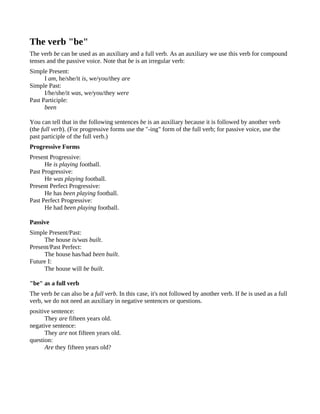
Durem 5
- 1. The verb "be" The verb be can be used as an auxiliary and a full verb. As an auxiliary we use this verb for compound tenses and the passive voice. Note that be is an irregular verb: Simple Present: I am, he/she/it is, we/you/they are Simple Past: I/he/she/it was, we/you/they were Past Participle: been You can tell that in the following sentences be is an auxiliary because it is followed by another verb (the full verb). (For progressive forms use the "-ing" form of the full verb; for passive voice, use the past participle of the full verb.) Progressive Forms Present Progressive: He is playing football. Past Progressive: He was playing football. Present Perfect Progressive: He has been playing football. Past Perfect Progressive: He had been playing football. Passive Simple Present/Past: The house is/was built. Present/Past Perfect: The house has/had been built. Future I: The house will be built. "be" as a full verb The verb be can also be a full verb. In this case, it's not followed by another verb. If be is used as a full verb, we do not need an auxiliary in negative sentences or questions. positive sentence: They are fifteen years old. negative sentence: They are not fifteen years old. question: Are they fifteen years old?
- 2. The verb "have" The verb have, too, can be used both as an auxiliary and as a full verb. As an auxiliary we use this verb to form compound tenses in active and passive voice. (Use the past participle of the full verb.) Compound Tenses - Active Voice Present Perfect Simple: He has played football. Past Perfect Simple: He had played football. Present Perfect Progressive: He has been playing football. Past Perfect Progressive: He had been playing football. Compound Tenses - Passive Voice Present/Past Perfect: The house has/had been built. Note that have is an irregular verb, too: Simple Present: I/we/you/they have, he/she/it has Simple Past: I/he/she/it/we/you/they had Past Participle: had "have" in positive sentences As a full verb have indicates possession. In British English, however, we usually use have got (have being the auxiliary, got the full verb). full verb: I have a car. auxiliary verb: I have got a car. "have" in negative sentences and questions When we use have as a full verb, we must use the auxiliary do in negative sentences and questions. If we use have got, however, we do not need another auxiliary. have as a full verb: I do not have a car. Do I have a car? have as an auxiliary verb: I have not got a car. Have I got a car?
- 3. The verb "will" The verb will can only be used as an auxiliary. We use it to form the future tenses. The auxiliary verb "will" Future I: He will not play football. Future II: He will have played football. The verb will remains the same for all forms (no "s" for 3rd person singular). The short form for negative sentences is won't.' Examples: I will, he will I will not = I won't The verb "do" The verb do can be both an auxiliary and a full verb. As an auxiliary we use do in negative sentences and questions for most verbs (except not for be, will, have got and modal verbs) in Simple Present and Simple Past. (Use the infinitive of the full verb.) The auxiliary "do" in negative sentences Simple Present: He does not play football. Simple Past: He did not play football. The auxiliary "do" in questions Simple Present: Does he play football? Simple Past: Did he play football? The verb do is irregular: Simple Present: I/we/you/they do, he/she/it does Simple Past: I/he/she/it/we/you/they did The full verb "do" As a full verb we use do in certain expressions. If we want to form negative sentences or questions using do as a full verb, we need another do as an auxiliary. positive sentence: She does her homework every day. negative sentence:
- 4. She doesn't do her homework every day. question: Does she do her homework every day? Sentences without the auxiliary "do" In the following cases, the auxiliary do is not used in negative sentences/questions: the full verb is "be" Example: I am not angry. / Are you okay? the sentence already contains another auxiliary (e.g. have, be, will) Example: They are not sleeping. / Have you heard that? the sentence contains a modal verb (can, may, must, need, ought to, shall, should) Example: We need not wait. / Can you repeat that, please? the question asks for the subject of the sentence Example: Who sings that song?